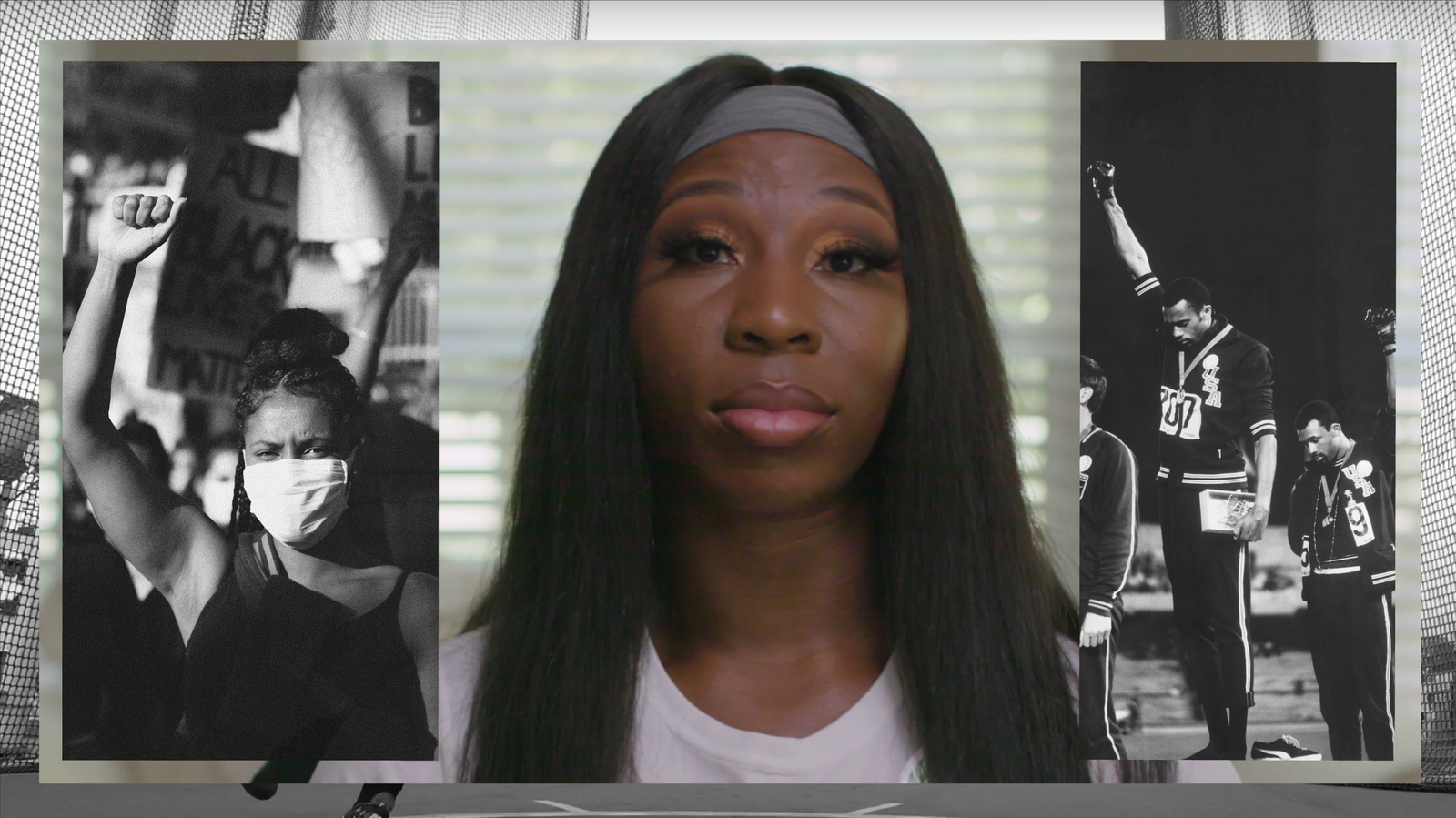Video by Lindsay Crouse and
Back
transcript
I Used the Podium to Protest. The Olympic Committee Punished Me.
The I.O.C. is on the wrong side of history, again.
-
What does it take to be an Olympian? “He’s a double Olympic champion!” Strength. “So Gwen Berry steps up.” Perseverance. “A new meet record.” Belief. “She came here ranked world No. 2.” I’m one of the best hammer throwers of all time. And I’m proud to be a U.S. Olympian. But you want to know what I think about racial injustice in America? It’s ——” [BLEEP] The Olympic Charter has a rule that bans athletes from protesting at the Olympic Games. If we protest, they punish us. That’s what happened to me. So last summer, at the Pan American Games, I threw 74 meters and I won gold. [CHEERS] I remember the medal was so heavy and so real. I was excited. I was nervous. [MUSIC PLAYING – ‘THE STAR SPANGLED BANNER’] In that moment, when the national anthem was playing, I knew that that national anthem did not speak for people like me in America. The freedom, liberty, and justice for all—it is not for Black people. Something came over me. I raised my fist. I felt like I was not at peace with myself if I had not said something or did something in that moment. “Hammer throw gold medalist Gwen Berry raised her fist—” “—raising her fist—” “—raised a fist to protest social injustice.” This is my letter. ‘Dear Gwen, this letter will serve as a formal reprimand from the United States Olympic and Paralympic Committee. Additionally, the U.S.O.P.C. considers you to be in a probationary period for the next 12 months.’ Now, I don’t know about you guys, but that does not make sense to me. So Rule 50 is a rule in the Olympic Charter that states that athletes cannot demonstrate any type of political, religious or racial propaganda in the field of play or on the podium at the Olympic Games. Raise a fist or take a knee? It’s not allowed. Here are the I.O.C. board members who are enforcing the rule. So the idea of white people telling Black people exactly what they can and cannot say or do is exactly why I protested. The I.O.C.‘s logic behind Rule 50 is to make sure everybody comes together. Everybody is kumbaya. Let’s just stick to sports. It’s ridiculous because there is no such thing as just sticking to sports. Every Olympic athlete has fought for something or believes in something. Of course we can protest outside the Olympic Village. But who will see that? No one. The whole world sees when we protest on the podium. I did something when it was not popular. I did it because, genuinely, this is how I feel. Genuinely, this is how I lived my life. And I’m tired of it. The Olympic Committee is on the wrong side of history, but not for the first time. During the 1968 Olympic Games, John Carlos and Tommie Smith raised their Black fists in the air. Just like me, they were punished. “And now, on November 1st, that same committee will be inducting these two men into the U.S. Olympic and Paralympic Hall of Fame. I guess better late than never, huh?” It’s hypocritical. The International Olympic Committee— they love the stories. They want to pitch, oh, well, this athlete grew up without a father, or this athlete grew up in the ghettos. This athlete had to go without food for months and months. But as soon as the athlete is the best athlete in the world, they say, oh, no, you can’t talk about racial discrimination in Black and brown neighborhoods. Oh, that’s not for you to talk about. But that athlete is literally a product of the system. It’s hypocritical because here I am— a Black, broke woman— saying that what they are doing to other Black people is wrong. And I was punished for it. I was disgusted. I just couldn’t believe it. “We, the National Football League, admit we were wrong for not listening to N.F.L. players earlier and encourage all to speak out and peacefully protest.” Other sporting bodies are finally confronting their past and allowing players to protest. “Major League Baseball players spent Opening Day sending a message— Black Lives Matter.” “NASCAR banning the display of Confederate flags at all events—” Thomas Bach, I know you want to keep the Olympics a place of harmony and focus solely on sports. You demand athletes like me to push past our limits and strive for excellence. It’s time for you to do the same. You need to get rid of Rule 50 and come up with something else. Standing up for what you believe, pushing for impossible dreams— that is the Olympic spirit. I’m ready for Tokyo 2021 and my next podium. And when I get there, I want to be able to raise my fist and my voice without being punished.
In sports arenas around the world, taking a knee is no longer taboo — it’s trending. But there’s at least one place where protesting is still not allowed.
The Olympic medal podium.
In the video Op-Ed above, the track and field Olympian Gwen Berry confronts Thomas Bach, president of the International Olympic Committee, over what she feels is his organization’s hypocrisy: Olympians are celebrated for their courage, drive and tenacity. But if they are spurred by those same traits to demand racial justice? That’s a punishable offense.
On the podium at the 2019 Pan Am Games, Berry raised her fist. Then she paid for it. She was reprimanded by the U.S. Olympic and Paralympic Committee and is now unsponsored. She is among the top hammer throwers in the world, but hasn’t received an athletic grant since protesting.
Berry is a Black woman without a safety net defying a global organization that brought in $165 million in profits in 2018. Yet athletes like her — who often scrape by — are faced with an impossible dilemma: keep their mouths shut or jeopardize their career to fight for justice.
Berry has fought to get to where she is today. She was raised by her grandmother in a household of 13 in Ferguson, Mo. After having a son at age 15, she earned a college scholarship and became a top hammer thrower. While training to qualify for the Olympics in 2016, she held down two jobs — working at Dick’s Sporting Goods during the day and delivering Insomnia Cookies at night — and helped support 10 extended-family members back home.
Last month, Team USA formed a council to make recommendations on race and social justice. But Berry says as long as free speech is censored, volunteer committees are not enough.
As for what she really wants? You’ll have to hear it from her in the video above.
This time, she won’t be silenced.
Gwen Berry (@MzBerryThrows) is an American Olympian.






















